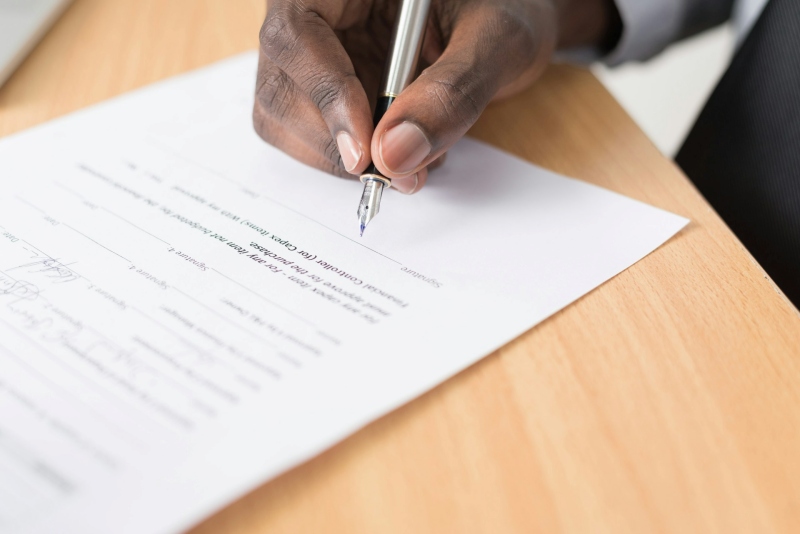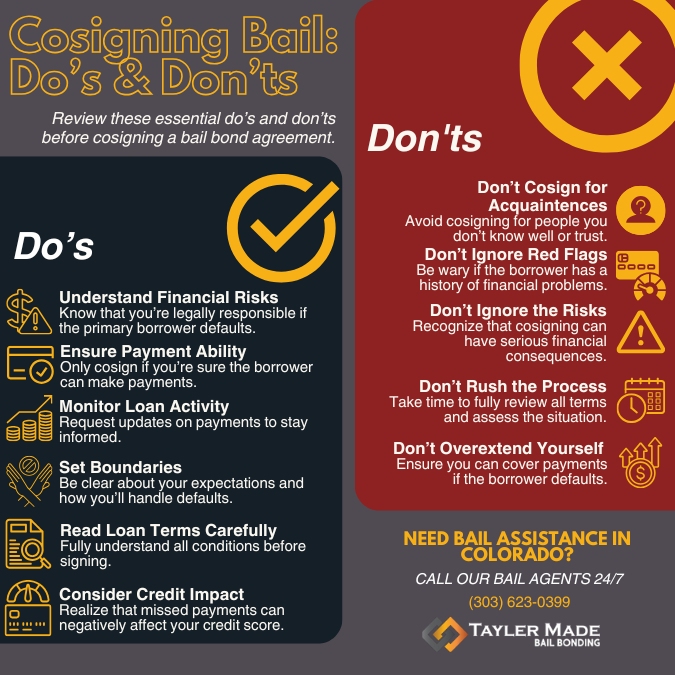Bail Bond Cosigners Guide: Essentials to Know Beforehand
News and Resources
When a person is arrested in Jefferson County, Denver County or elsewhere in Colorado they are brought to jail and processed. After being informed of the charges against them they are offered bail from a bail schedule. If the charge is fairly inconsequential the accused may have enough cash on their person to pay the bail outright, or they may be able to use a credit card to pay the bail.
In instances when the bail amount is more than a person can afford they can work with a bonding company who will post a bail bond in return for a modest fee. In many cases accused individuals will need to enlist the help of a co-signer who agrees to put up the bond fee either in the form of cash or collateral. In this post, we take a close look at the role of the co-signer as well as who is and is not eligible to co-sign for a bail bond.
Co-Signing a Bail Bond Agreement: What’s Involved?
When a person co-signs a bail bond they sign a promissory note which obligates them to pay the full bail amount to the bondsman in the event the person they are co-signing for fails to appear in court to face the charges against them. As soon as the bondsman is in possession of the promissory note they post the bail bond and the accused is released from jail.
Co-signing often involves producing evidence that you have enough cash or other assets to be able to meet that obligation to the bondsman if the person you are co-signing for disappears. Assets accepted as collateral may include a home, a car, jewelry or other items.
Who Can Become a Co-Signer?
Many people are surprised to learn that not everyone is eligible to co-sign for someone’s bail bond. There are, in fact, well-established criteria that typically must be satisfied before a potential co-signer will be accepted by the bail bond company. Those include:

- The person’s credit history – As is the case when buying a car or making any other type of financial commitment where large amounts of money are involved, people with bad credit are typically not allowed to co-sign a bond agreement. The thinking is that if they have a spotty record meeting other financial obligations why should the bondsman believe they will honor their duty to pay the full bail bond amount if the accused flees?
- The person’s work history – If a person is independently wealthy then this variable will not enter into the equation. But most people are not independently wealthy so the bondsman will often take their work history into consideration before accepting them as a co-signer. Again, this is because the bondsman - who is after all assuming the risk of issuing the bond - needs as many assurances as possible that a potential co-signer is a dependable individual with a history of living up to their responsibilities.
- The person’s background and personal history – Foreign nationals cannot co-sign bail bond agreements in Colorado, for obvious reasons. Also, most companies that offer bail bonds want a potential co-signer who has roots in the community, not someone who is passing through or who lives in another state. This indicates a reduced chance that they will run from their responsibilities if the person they co-signed for fails to appear in court.
Is Co-Signing Irreversible?
No. If a co-signer starts to believe the person they helped may leave them holding the proverbial bag they can get in touch with the bail bond agent and ask for the bond to be rescinded. In that case, the bondsman will arrange for the accused to be taken into custody and returned to jail.
The potential co-signer also has the right to add conditions to their assistance. For example, they can stipulate that they will only co-sign if the accused agrees to join a drug treatment program, or if they agree to undergo a psychiatric evaluation.
Co-Signer Responsibilities
Once a person co-signs a bail bond for an accused individual a variety of responsibilities come to rest on their shoulders. The first of these is the obvious financial responsibility as we discussed a moment ago, but that is not the only one.
The co-signer also becomes responsible for making sure the accused makes all their court appearances and that they abide by the terms of their release. They are also responsible for making sure the accused checks in with their bail agent if that is a condition of release.
Should the accused fall ill or otherwise have a legitimate reason for not making their court appearance it’s incumbent upon the co-signer to notify the bail bondsman and the court in a timely fashion.
If, after reading all this you get the feeling that co-signing a bond agreement is not for everyone, you’re right. But not just because things can sometimes become unpleasant for the co-signer. The fact is, even people who are more than willing to co-sign for someone may not be eligible to do so.
Must a Co-Signer Always Offer Collateral?
No. If the potential co-signer can prove they have deep enough pockets to cover the entire amount of the bond if the defendant fails to appear in court then no collateral will be necessary.
Most bondsmen are even-tempered sorts who evaluate situations on a case-by-case basis. If they think the potential co-signer is a solid member of the community they may be lenient when it comes to asking for collateral.
At the same time, they are realists. So, if they have reason to doubt the credentials of the potential co-signer they may insist on collateral, or they may simply refuse to accept the person as a co-signer.
Before agreeing to co-sign for a bail bond agreement, review the following list of do's and don'ts.

Click here to download a PDF version of the infographic above.
For Affordable Bail Bonds in Golden, Contact Tayler Made
While most co-signers wind up not having to forfeit cash or assets there are occasions when a person accused of a crime decides to flee rather than face the charges against them. In such instances, the person who co-signed for them is left to deal with the financial fallout. The bottom line is to think carefully before you decide to co-sign for someone else's bail bond.
If you or a loved one finds themselves in need of bail at any time of the day or night contact Tayler Made for 24-hour bail bonds. We’re here to help, so give us a call at (303) 623-0399.
Contact Info
Tayler Made Bail Bonding is available 24 hours a day and 7 days a week.
(303) 623-0399email@taylermadebailbonding.com
3595 South Teller Street
Suite 300A
Lakewood, CO 80235
@TaylerMadeBail

